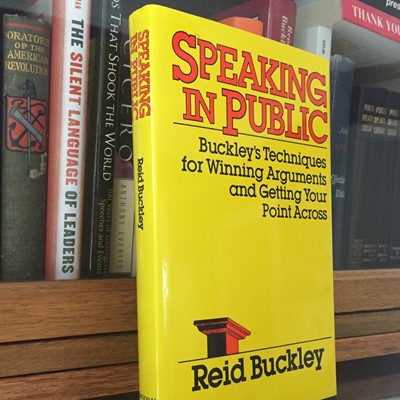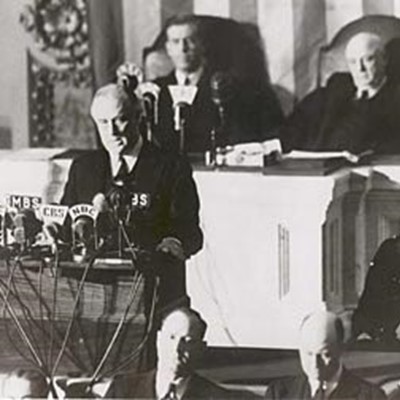
Thirty years ago, The Buckley School launched its flagship program and our founder Reid Buckley published his first book on public speaking. To mark the anniversary this year, we’re featuring public speaking tips and instructional excerpts from that book—"Speaking in Public: Buckley’s Techniques for Winning Arguments and Getting Your Point Across." Below, a few of this thoughts on one of his favorite topics: temperament and the speaker.
"Go on and check with that old shoe, your spouse…inquire of your best friend, if you can do so and retain him as a friend…take a fresh and unbiased gander at your corporate effectiveness reports…to determine what type of personality you best represent."
– Along with Myers-Briggs, a few ways Reid Buckley suggested for getting a true view of strengths and weaknesses.
From Chapter 2: Making the Most of Your Fool Self
Well-disciplined emotion—organized emotion—is what all people who use their voices professionally aim to achieve, whether they be actors on the stage, or coaches of athletic teams, or politicians and statesmen, or spokesmen for businesses.
If you want to exercise to the fullest you inherent capacities for counting for amount to something in a public way, or plain leading, you must be able to communicate with a conviction that carries your audience.
This means that you must contrive to unlock the wellsprings of passion. You cannot allow yourself to be phlegmatic, even though this be your "nature.
Temperament: Not Just for Hams and Demagogues
We boast at the school that we try to help everyone realize to his maximum potential what by genetical determination comes naturally to him—the cool man his cool, the hot man his heat, the intellectual her ratiocination, the folksy fellow his wit—but in this crucial matter of the temperament, there is no alternative. It must be excited.
If you would speak so that people listen, and so that they act on your recommendations, or adopt your conception, or even buy your wares, you have to learn to rouse yourself—to excite yourself intellectually, and thus emotionally, about what you are doing, what you are selling, the case you are making—in order to spark the interest of your audience.
Furthermore, you must accomplish this within character: that is according to your born (or acquired) temperament. Hams and demagogues incur our fastidious disdain, but no speaker carried any crowd without being a bit of both.
Commitment: Passion with a Purpose
Commitment need not be rabid, nor undiscriminating, as passion can err in being.
Passion is a dangerous weapon. If overdone, it can embarrass or alienate an audience. It can invite mockery and become for the speaker a disaster.
But without the passion deriving from commitment there was nothing ever done, nor any adventure even embarked upon, because unless the speaker’s own heart is moved, never can he expect to move the hearts of his fellow men.
How to walk this tightrope? The way to avoid the dangers of slopbucketing emotion is to activate the heart second by engaging passionately the intellect first.
 In his first book on public speaking, Reid broke a lot of his own rules--but firmly made the case that your greatest strength lies in being yourself.
In his first book on public speaking, Reid broke a lot of his own rules--but firmly made the case that your greatest strength lies in being yourself.
Identifying and Using Your Natural Style
Temperament is the sine qua non of public speaking. It is the absolute necessity.
But what if one is unpugnacious, pacific and sanguine by nature? Well, one is now talking in terms of temperament as a personality or character.
The trick here is to work with one’s natural bent withal learning how to tap that other species of temperament: the furnace in the belly consisting of ambition, despair, fright, desire, and genius, or at the least some embers thereof, that produces great divas, great comedians, great industrialists, great statesmen and too many demagogues.
The Perils of Wishful Thinking
There are the tragic folk who all their lives make the same mistakes, who expend their energies vainly pushing the square corners of their trues selves into round holes.
They are unhappy and unsuccessful, or if they are successful doing that they do best, unhappy because they are not allowed to do also what they are rotten at. Typically, the genius-founder of a Silicon Valley high-tech company comes to mind—the man of visionary imagination—who likes to conceive of himself as a corporate executive too.
Wishful thinking about oneself in a different way can wreak havoc with one’s delivery. If one persists in the folly of one’s illusions or delusions about oneself, one will attempt to convey a platform impression or to speak in a language and in manner that are not true to character. There will be a dissonance. The audience will at once sense the anomaly.
Each of us must exploit our given temperament, polishing the virtues, mitigating the faults We can never hope to step out of character, nor should we try; rather the aim, once having determined what our true character is and how we are perceives by others, is adroitly to make use of the potential.






